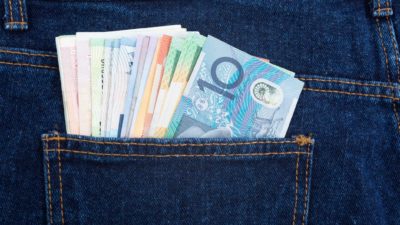The TPG Telecom Ltd (ASX: TPM) and Vodafone Hutchison Australia merger is yet to be approved with the ACCC likely to be running a close ruler over it, but if it's approved the combined entity is likely to attract more powerful institutional investors by virtue of its dividend payments alone.
The combined entity expects to pay out at least 50% of net profit as dividends (adjusted for one-off restructuring costs) and assuming it can maintain a medium-term leverage target of 1.5x – 2x net debt to EBITDA (operating income).
The merged group will have a net debt to pro-forma EBITDA ratio of 2.2x on the basis that net debt would stand at $4 billion. Notably then it seems it would have to bring down its debt or lift its EBITDA prior to hitting its 50% payout ratio.
Still if its debt and EBITDA jaws move in the right direction investors could expect a healthy stream of dividends down the line as the mobile and home broadband industry is generally known for its income streams thanks to the relatively defensive nature of recurring revenues and profits.
Vodafone Hutchinson's parent company the $80 billion Vodafone Group PLC is a well-known 'go to' dividend stock for institutional investors across the UK and Europe for example. In that sense it is no different to local favourite and TPG rival Telstra Corporation Ltd (ASX: TLS).
In fact Vodafone Group pays out close to 100% of profits as dividends and I would not be surprised to see the TPG / Vodafone Group lift its payout ratio over the long term.
It will also face less pressure from shareholders than Telstra or the Vodafone Group to lift payout ratios (as TPG is still largely in the hands of Teoh and his friends at Washington H. Soul Pattinson & Co Ltd (ASX: SOL), which is a positive given the demands of investing in 5G mobile and other network infrastructure.
While I suspect the group is also likely to aggressively invest in price discounting in attempting to win market share (while maintaining profit margins) from the less well run Telstra. For at least 2-3 years more the 4G sector will remain the key battleground for telcos to fight over.
The other carrot on the horizon for existing TPG shareholders is the prospect of a potentially sizeable fully franked special dividend.
Under the terms of the deal, TPG will be able to pay out in cash the difference between its actual net debt as at January 31 2019 and the estimated net debt figure of $1,672 million (plus a $352 million spectrum payment) on that date.
In the merger announcement TPG reported existing net debt at $1,266 million at more than $400 million lower than the targeted amount, with it also having potential to pay out excess franking credits it has on its balance sheet as a taxable entity. As a quid pro quo for Vodafone Hutchinson shareholders I think the deal has been structured so its own debt is reduced by the TPG adjustment amount (special dividend) multiplied by 1.163.
I would caution shareholders to do their own further research into the potential amount of the final special dividend (as there's a lot of water under the bridge ahead and inputs to consider) as my time is limited, but it seems the special dividend could be a substantial amount per TPG share.
The group will hand in its full year profit result on Tuesday September 18, with an online webcast of what's likely to be a crammed earnings call likely to feature analysts' questions over the potential dividend size.
I'm holding onto my TPG shares and expect there could be more good times ahead as the new group will have the cash flow scale to invest while paying dividends over the next 3-5 years.
As such I expect it could be superior dividend and growth investment to traditional favourite Telstra from here.





